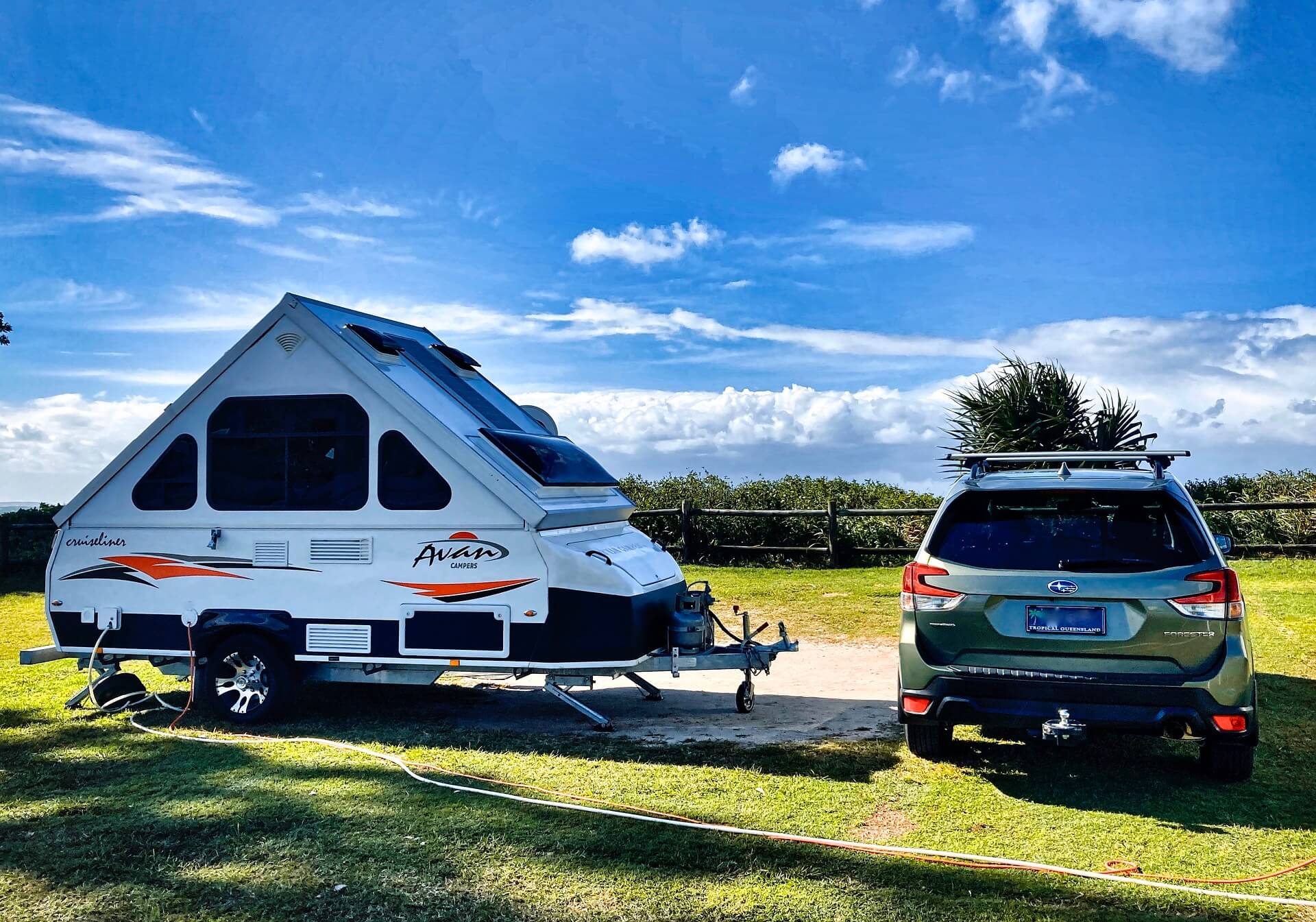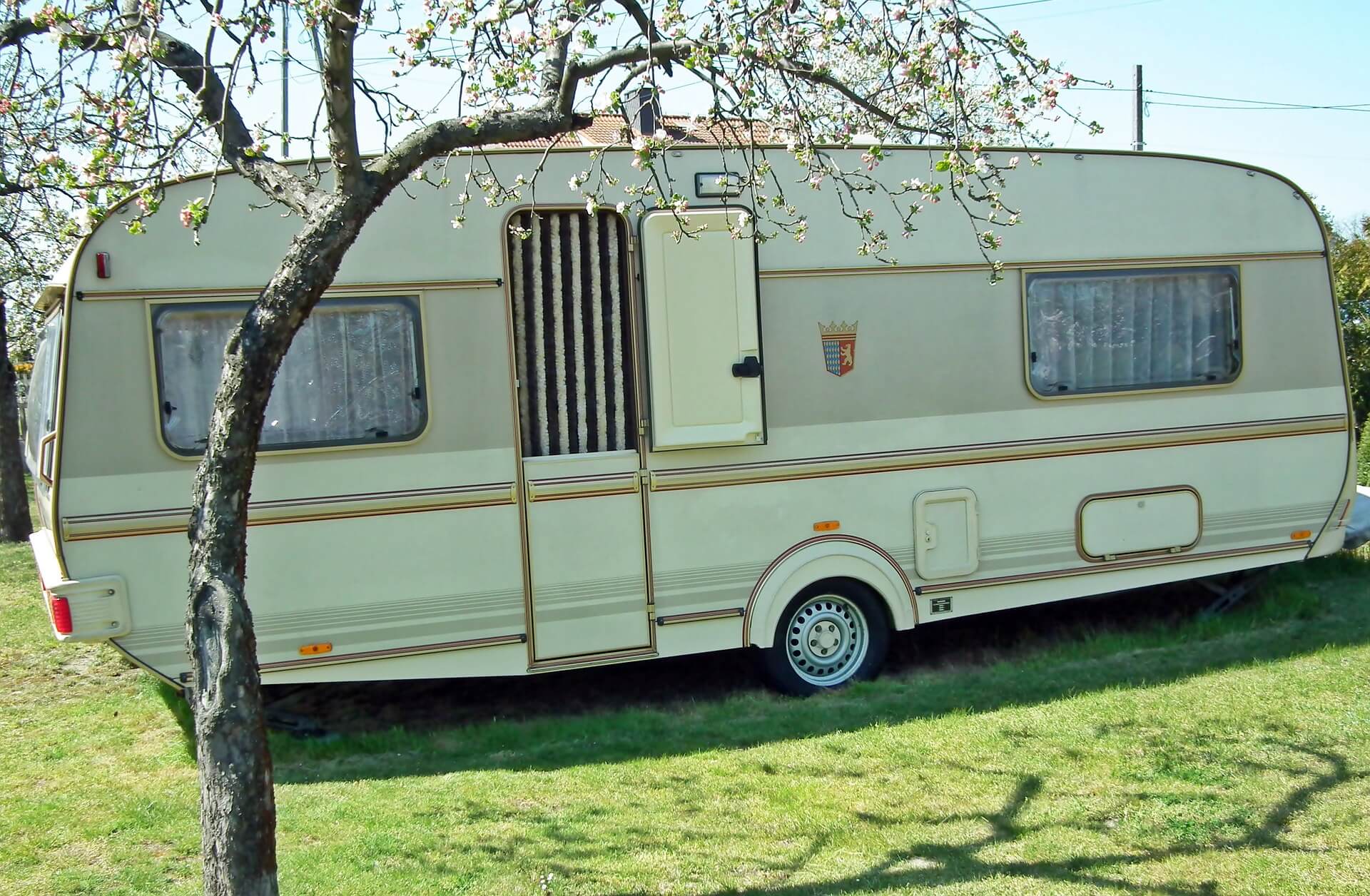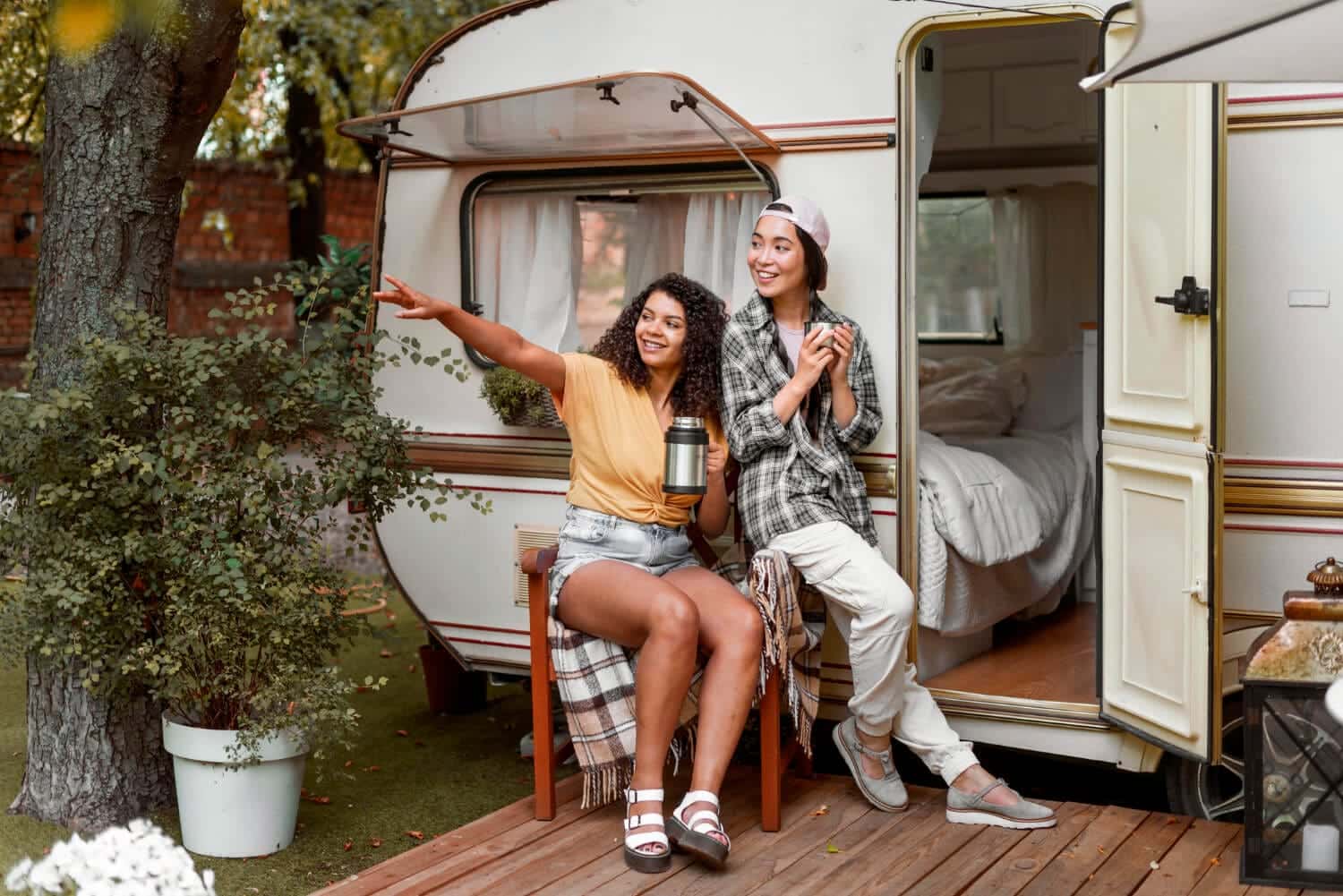

When you determine that buying a used RV is the right decision, opting for a pre-owned model can often be the most practical choice. However, evaluating a pre-owned RV requires a different approach than a brand-new one. This is where our ultimate inspection checklist for buying a pre-owned RV becomes essential, helping you find the perfect motorhome for your family or business.
This used RV buyer’s guide is organized into three main pre-owned travel trailer buying phases: Research, Purchase, and Post-Purchase. Each phase includes crucial considerations to ensure a successful and informed purchase. Before we dig into the nitty gritty, let’s look at some of the pros and cons of buying a used travel trailer.
Buying a used trailer for your business or personal use comes with its own set of advantages and disadvantages. Here are some key points to consider:
Used travel trailers are generally much cheaper than new ones, often costing 20-40% less than a new model.
Since the initial depreciation has already occurred, the value of a used travel trailer tends to hold more steadily.
Previous owners may have added functional upgrades or modifications, saving you the cost and effort of doing them yourself.
As the value of the used trailer is lower than that of a new one, insurance premiums are typically lower than that of a new one.
Any initial warranty repairs and issues that come with new trailers may have already been addressed.
By weighing these pros and cons, you can make a more informed decision about whether a used travel trailer is right for you.
When deciding whether to buy a camper from a dealer or a private seller, weighing each option’s pros and cons is essential. Choosing between a dealer and a private seller depends on your priorities. A dealer will be the better choice if you value warranties, support, and financing options.
A dealer will often provide warranties and after-sales support, giving you peace of mind. In addition, trailers from dealers are usually inspected and serviced before sale, reducing the risk of hidden issues. Dealers typically offer financing options, making it easier to manage the purchase cost. You can also trade in your old trailer, which can reduce the overall cost of your new purchase.

Diligence is crucial when making any purchase, and this is particularly true for used travel trailers. Given the significant investment involved, it’s essential to evaluate various factors carefully. We cover what to look for when buying a used trailer.
While it may seem obvious, it’s easy to become captivated by modern travel trailers’ numerous features and upgrades when visiting a dealership. Knowing your spending limit and adhering to it throughout the process is crucial. Remember, additional costs will be beyond the initial purchase price, such as insurance, maintenance, and repairs.
At this point, it’s also worth considering how long you intend to keep the trailer. If you want to keep it for a couple of years, factor in the resale value of various models. There’s no point in sinking your capital into a trailer that you may struggle to sell in a couple of years.
Consider the floor plan you need to accommodate your family or group comfortably. Think about issues such as hosting family and friends. Will you be looking for a sleeping space for them? How do you like to camp? Do you prefer a spacious living area or kitchen, or are you looking for more storage space? Also consider the times of year that you enjoy camping. Will you have to stay inside due to snowy or wet conditions? All these factors influence what trailer you need to look for.
Where do you intend to tow? Are you the adventurous type who wants to venture into wilderness areas, or are you more likely to stick to major routes? If you’re a wilderness person, then you need to consider a trailer suited to travel over rough terrain that will not be shaken to pieces after one trip.
Check your vehicle’s towing capacity. This is crucial, as you need to ensure your vehicle can safely tow the travel trailer. This will also indicate the type of hitch you’ll need. There would be no point in buying a trailer with a gooseneck hitch if your vehicle does not have a gooseneck connection.
Identify the must-have features for your new travel trailer. Examples include awnings, slide-outs, or solar panels.

Use our used RV buying guide when inspecting a used travel trailer, consider several key factors to ensure a well-informed decision. Take your time when checking the travel trailer, and take along your partner and a friend to give you more than one view of the vehicle. Let’s look at what to look for when buying a used camper. Title and Ownership will be done for you, if you’re buying from a dealer.
Older models may lack modern features and amenities. Consider if the age of the trailer aligns with your needs and expectations.
Check the mileage to gauge how much the trailer has been used. Higher mileage can indicate more wear and tear.
Lack of maintenance records, visible neglect, or worn-out components are all indicators that this trailer may have had a hard life. Ask for maintenance records to see how well the trailer has been cared for. Regular maintenance can be a good indicator of the trailer’s overall condition.
Batteries in Campers are essential, and you should be aware of their ins and outs. Ask if 12 V or 6 V batteries are used, and verify whether the batteries are deep cycle or not. Check the age of the current batteries in place. Batteries generally last for around 4-5 years in travel trailers. Check if an inverter is installed.
Inspect the tires for wear and ensure they are in good condition. Old or worn tires can be a safety hazard.
Test all features and amenities, such as the awnings and any included appliances. Make sure everything is functioning as expected.
Water damage can be a major issue in used travel trailers as it can lead to structural issues and mold growth. Look closely at the roof, windows, and seams for leaks and signs of past leaks, such as stains, soft spots, or musty odors.
Check for signs of pests, such as droppings or nests. Pests can cause significant damage to the trailer’s structure and systems.
Compare the asking price with similar models on the market to ensure you’re getting a fair deal.
Take the trailer for a test drive to see how it handles on the road and ensure your vehicle can tow it comfortably.
By thoroughly inspecting these aspects, you can make a more informed decision and avoid potential issues down the road.

Here are some steps to take after buying your used travel trailer:
Ensure the title is transferred to you and the trailer is registered in your name. Update or purchase insurance to cover your new travel trailer.
Even if you inspected it before buying, do a thorough inspection again to familiarize yourself with its condition and identify any immediate issues.
Thoroughly deep clean the interior and exterior. Sanitize the water system to ensure it’s safe for use. Replace the bed mattresses.
Fix any minor issues you identified during your inspection. Consider taking it to a professional for a detailed check-up. Test all systems (plumbing, electrical, HVAC) to ensure they are working properly and to familiarize yourself with how they work.
Update and ensure all the safety equipment is working. This includes items such as fire extinguishers, smoke detectors, and carbon monoxide detectors.
Stock up on necessary supplies such as bedding, kitchenware, and toiletries. Don’t forget to include a small toolset with spare parts for repairs (e.g. o-rings, duct tape, plastic ties etc.).
Join online forums or local RV clubs to connect with other travel trailer owners. These groups can be great resources for tips and advice.
Read the owner’s manual and any other documentation that came with the trailer.
Plan a short trip to test everything out and get comfortable with towing and setting up the trailer. This allows you to draw up a checklist of items to bring and tasks to complete before hitting the road.
By following these steps, you’ll be well-prepared to enjoy your new travel trailer and make the most of your travels.
Purchasing a used travel trailer can be a rewarding and cost-effective way to embark on your adventures. You can find a reliable and comfortable home on wheels by carefully inspecting the trailer, understanding its history, and considering your specific needs. Knowing what to look for when buying a used travel trailer can save you dollars.
Remember to prioritize maintenance and safety, and take the time to familiarize yourself with your new travel companion.
With Millennium Trailers, your used travel trailer can provide countless memorable experiences on the open road. Happy travels!
John Smith (31/1/2024), Camper Outdoor [blog], Buying a Used Travel Trailer Checklist, Buying a Used Travel Trailer Checklist – Camper Outdoor, (15/8/2024)
G. Yoganand, Camper Grid [blog], 11 Questions to Ask When Buying a Used Travel trailer or RV, 11 Questions to ask when buying a used travel trailer or RV – Camper Grid, (15/8/2024)
Alexandria Moran (5 March), Once Upon a Moran [blog], The Motherload of Questions to Ask When Buying A Used RV, The Motherload of Questions to Ask When Buying A Used RV — ONCE UPON A MORAN blog, (15/8/2024)
Explorer RV Club (1/3/2022), Explorer RV Club [blog], Buying a Used RV From A Dealer or Private Seller: What’s Better?, Buying a Used RV From A Dealer or Private Seller: What’s Better? – Explorer RV Club, (15/8/2024)
Aaron Richardson (25/6/2024), RVing Know How [blog], Should You Buy An RV from Dealers Or A Private Sellers?, Should You Buy An RV from Dealers Or A Private Sellers? (rvingknowhow.com), (15/8/2024)
Jeff Campbell, RV Parenting [blog], Pros and Cons of Buying a Used RV, Pros and Cons of Buying a Used RV | RV Parenting, (15/8/2024)
Joe Russo (3/1/2024), We’re The Russos, Pros & Cons of Buying a New vs Used RV – Why We’ve Only Had New, Pros & Cons of Buying a New vs Used RV – Why We’ve Only Had New – WE’RE THE RUSSOS (weretherussos.com), (15/8/2024)
Millennium Trailers is your trusted partner for high-quality trailers at unbeatable prices. Serving all 50 states, we’ve delivered over 5,000 trailers nationwide.
Established in 1998, we’re a company dedicated to meeting your hauling needs with excellence. Whether it’s cargo trailers or custom living quarters, we provide a wide range of options to suit your requirements. Our knowledgeable and friendly team ensures a smooth buying experience with personalized assistance. Proudly offering competitive pricing, state-of-the-art designs, and easy financing options. Committed to customer satisfaction, we strive to simplify the process of finding your perfect trailer.
Choose Millennium Trailers for a reliable, customized solution that delivers quality and value for your investment.
Copyright 1998 – 2023 Millennium Trailers, Inc.